Germany’s Ukraine air defense initiative falls flat
Berlin promised to help Ukraine source crucial air defenses, but the reality has been disappointing.
Germany responded to Ukraine’s call for more air defenses by promising to send some of its own systems and marshalling help from other allies — but almost no one else is following Berlin’s lead.
Berlin has so far pledged three of its 11 U.S.-made Patriot batteries along with over 50 Gepard shorter-range air defense systems and air-to-air missiles, able to counter the hail of ballistic missiles, bombs and drones hammering Ukraine’s cities and critical infrastructure.
For weeks, senior German politicians — principally Foreign Minister Annalena Baerbock and Defense Minister Boris Pistorius — have been leaning on allies to follow through on their commitments to gift Patriot air and missile defense batteries to Ukraine.
Sending more is an “absolute priority,” Baerbock said during a trip to Kyiv on Tuesday, where she said Berlin had helped raised €1 billion to support Ukraine’s aerial protection.
But the response from other countries has fallen flat.
Germany has spent the past month talking up its Immediate Action on Air Defense initiative, as first reported by POLITICO, but partner nations are unwilling to send the desperately-needed batteries to Ukraine, two people familiar with the talks said.
While the German initiative also covers alternatives such as SAMP/T, NASAMS, HAWK, IRIS-T or S-300 air defense systems, it’s the Raytheon-developed Patriots that are most effective against attacks. The benefits of Patriots are clear, with Ukrainian troops already trained to use the truck-mounted launcher system alongside radars and interceptors.
NATO Secretary-General Jens Stoltenberg has been clear that there "are systems that can be made available to Ukraine."
But coordinating how to get them into the hands of Ukrainian soldiers isn’t easy.
“There is no European leadership and no unity between the main actors,” said Nico Lange, a former chief of staff at Germany’s defense ministry and now a fellow at think tank CEPA. “The sense of urgency has not increased, there’s more a sense of relief now that the Americans are delivering again.”Although not many missile systems are being sent east, countries are making smaller pledges.Germany’s defense ministry said Belgium, Denmark, Norway, Canada and the Netherlands have committed financing and France, Spain, Romania, Lithuania, Belgium, the United States and the United Kingdom promising to chip in materials and rockets.Latvia wants to join the program too, the ministry said.
Patriot games
One of the reasons for the reluctance to send Patriots is that they are expensive — around $1 billion per unit — and each interceptor missile it fires costs millions.What’s more, countries aren’t willing to accept the blow to their own air defenses necessary to make good on deliveries to Ukraine, said Fabian Hoffmann, a researcher working on missile technology at the University of Oslo.
Emma Davis



































